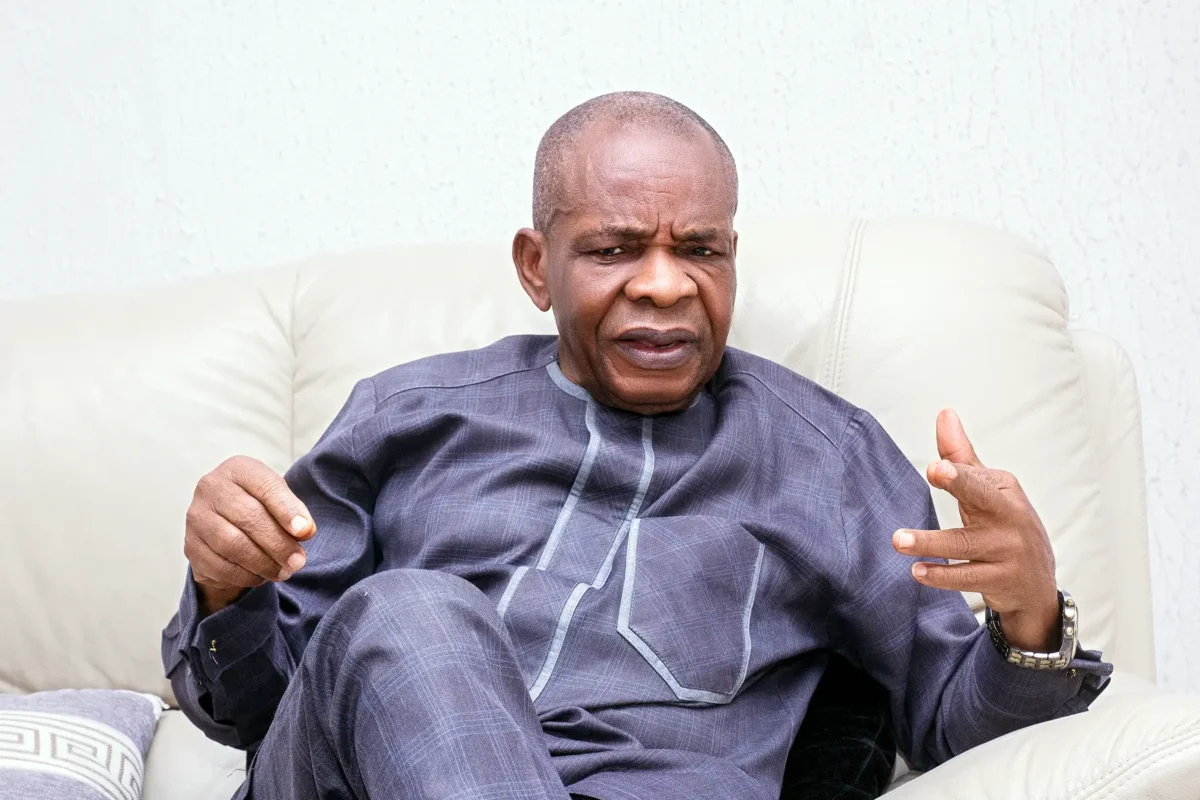National
Nduese Essien At 80: Service To Man And Country
By Etim Etim

Quintessential gentleman, Chief Nduese Essien has formally stepped into the class of octogenarians and prolific writer, Etim Etim gives a profile of the statesman in service to men and his country.
January came with mixed emotions in Akwa Ibom State with the passage of two of its political leaders – Senator Itak Ekarika and a former member of House of Representatives and businessman, Hon. Bassey Etim.
They served the country diligently at the National Assembly and contributed immensely to the development of the state in various capacities. I shall devote more space for them in another piece, but for today, I will like to pay attention to another icon, statesman, two-term member of the House of Representatives and former Minister of the federal republic, Chief Nduese Essien, who turned 80 on Saturday, February 2.
He was in the House between 1999 and 2007, and on April 6, 2010, President Goodluck Jonathan appointed him minister of the newly created Lands, Housing and Urban Development ministry. As a pioneer minister, Chief Essien not only established the requisite bureaucratic structure and human resources, he also ensured the review of the National Building Code, resolved the lingering crises at the Federal Mortgage Bank and the Federal Housing Authority and completed the ministry’s headquarters building.
Chief Essien is a community leader, elder statesman, astute politician and my good friend. I send my best wishes to our newest octogenarian, a man of noble pedigree and good breeding.
Even as a young businessman, Chief Nduese Essien was a household name in the 1980s when he founded and managed a chain of bookshops known as, Students Care Bookshop, in Calabar and its environs. It was a favourite shopping place for books and stationeries in those days for undergraduate students.
But I only got close to him in 2021 while writing a book on the oil politics of the Obasanjo presidency. In a clear violation of the Constitution, President Obasanjo had refused to pay the Niger Delta States, especially Akwa Ibom State, the 13% oil revenue from derivation.
This led to a six-year fight between the federal government on one side and some Akwa Ibom professionals, activists, elders and politicians led by then-governor Victor Attah. I should note that the other Niger Delta States were also deeply involved in the struggle. The book, ‘’Akwa Ibom Heroes: Inside the Struggle for the abrogation of onshore-offshore oil dichotomy’’, published in December 2021, details the various dimensions of this struggle and the 13 persons who played major parts on the side of the Akwa Ibom State government. Chief Nduese Essien is one of them.
I interviewed him (and others) for weeks and got deep insight into the politics and fights that led to the scrapping of the obnoxious dichotomy and the compromises and negotiations that resulted in the creation of NDDC.
On his vantage position as the Chairman of the South-South Parliamentary Caucus of the National Assembly, Chief Nduese Essien worked with governors, lawmakers, technocrats and others to achieve what has become a major milestone in the history of Akwa Ibom, and till this day, his invaluable contributions continue to inspire succeeding generations of leaders.
In addition to leading the caucus, he also served on the House committees for internal affairs and women affairs in his first term, and because of his integrity and self-discipline, he was appointed chairman of the House Committee on Anti-Corruption, National Ethics, and Values upon his reelection in 2003. Additionally, he was elected regional director in charge of West Africa and served as chairman of the Nigerian Chapter of the African Parliamentarians Network against Corruption.
On Sunday, a large crowd of dignitaries, led by Governor Umo Eno, trooped to his hometown to celebrate with him. In speeches after speeches, the dignitaries praised the octogenarian for his patriotism, love for his people and mental acuity. ‘’Chief Nduese Essien is a leader with the courage of his convictions. His intellectual and patriotic contributions have earned him deep respect and admiration across borders’’, said Senator Ekong Sampson, Chairman of the Senate Committee on Solid Minerals, who represents the elder stateman in the upper chamber.
Born on February 2, 1944, in Nta Isip, Ikot Ibiok in Eket Local Government Area of Akwa Ibom State, Chief Nduese Essien is one of Nigeria’s most remarkable national lawmakers, political activists and thought leaders. He attended the Qua Iboe Church Primary School, Usung Inyang Eket, before proceeding to the Salvation Army Secondary School, Akai Ubium, all in today’s Akwa Ibom State, for his secondary education. He later moved to St. Augustine’s Grammar School, Nkwere, Orlu, Imo State, where he completed his secondary education before proceeding to the Ahmadu Bello University, Zaria where he earned a B.Sc in Business Administration in 1972.
Soon after he left ABU, Chief Essien was hired by Nigerian Chronicle newspaper, Calabar, then a thriving state-owned newspaper, and was assigned to the commercial division. From the Chronicle, he joined College of Technology, Calabar (now Cross River State University of Technology), as a lecturer. He left in 1979 to start business consultancy which soon diversified into other ventures, including Students Care Bookshop, one of the biggest indigenous bookshops in the then Cross River State.
As a young man, Chief Essien was interested in in the politics of the time which largely focused on military rule, state creation and the return to democracy. He never missed an opportunity to speak up in local and national conversations. He is well-known among his peers, particularly in St. Augustine’s Grammar School, Nkwere, and ABU, where he began his activism. In 1979, he was elected Public Relations Officer of the defunct National Party of Nigeria (NPN), Eket chapter.
After his two terms at the National Assembly, Chief Nduese Essien returned to live with his people in Eket, supporting grassroots, state and national initiatives at peace and consensus building especially during the peak of militancy in the Niger Delta region. He was appointed to serve on the National Technical Committee on the Niger Delta.
It was the committee that created the blueprint for peace, which culminated in the Federal Government’s Amnesty Programme and the creation of the Ministry of Niger Delta Affairs. In 2014, Chief Essien was appointed into the National Reform Conference where he joined eminent Nigerians from all walks of life to produce a report that could have resolved some of our national issues if it had been implemented. It was shortly after the National Conference that he voluntarily retired from active politics. Chief Nduese is my neighbour in Uyo, and I have formed the habit of walking over to see him whenever we are in town. He is an intellectual with a laser-sharp mind who swerves easily from serious sociopolitical discussions to jovial banters, interspersed with loud guttural laughter.
Nduese Essien has been honoured with many chieftaincy titles, including the Attah of Eket, Adaidaha ke Efik Ebrutu, Onwa Na’Etiriora of Amanze Kingdom in Anambra State, among others. I join others to wish Chief Essien good health as we look forward to his climbing up the ninth floor!
Send Us A Press Statement Advertise With Us Contact Us
And For More Nigerian News Visit GWG.NG


